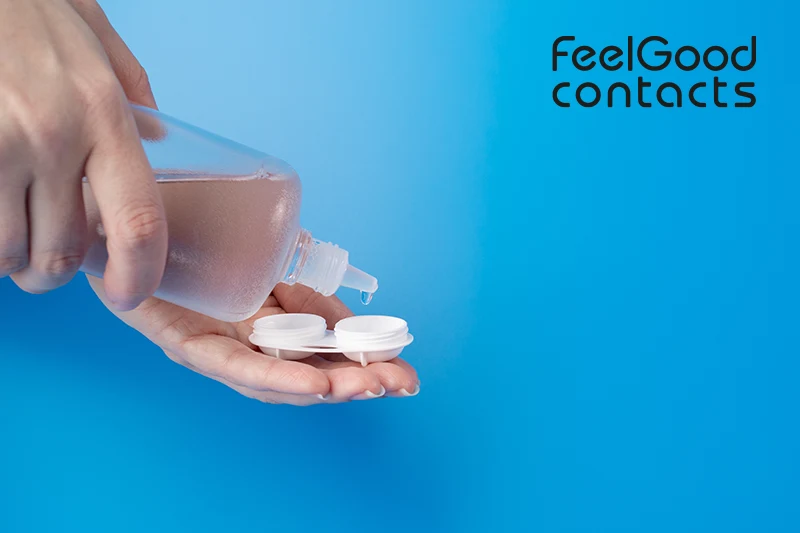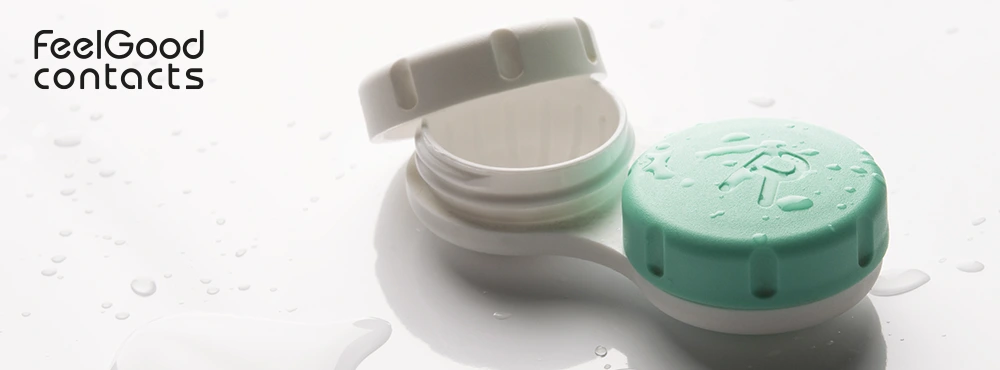If you're one of the billions who wear contact lenses, you might be doing something risky without even realising it - wearing them in or cleaning them with water. Shockingly, studies show that 37% of wearers swim with their lenses, without their swimming goggles on. Additionally, up to 44% are unaware that showering with lenses is a big no-no. Water exposes your eyes to harmful germs, like the vision-threatening Acanthamoeba parasite. It's time to take this simple rule of keeping your contact lenses away from water to protect your vision. Keep reading to learn more.
Why contact lenses and water shouldn’t be mixed?
Contact lenses and water should never be used together. Even washing your hands and not drying them properly can transfer water to your lenses, risking infections such as Pseudomonas or Acanthamoeba Keratitis that can result in vision loss or eye removal in severe cases. These infections expose your eyes to pain, redness, blurry vision, light sensitivity and excessive tearing. Water can also cause your contact lenses to change shape, which can then cause a lot of discomfort.
Is contact lens solution made from water?
Almost all contact lens solutions are made up of water, but the inclusion of other ingredients changes their entire structure to make them safe for your contact lenses. An FDA-approved contact lens solution will never consist of just water. They might have different make-ups according to their purpose and manufacturer, but most commonly also have:
- Disinfectant: Helps kill bacteria and harmful microorganisms
- Wetting agents: To keep your lenses moist and comfortable
- Surfactants: To help clear up any residue stuck to the surface of the lens
- Preservatives: To prolong the shelf life of the solution
Can I store or clean my contact lenses in water?
No, you should never clean or store your lenses in water. They should always be stored in a contact lens solution. Although drinking water is generally safe for consumption, it is not sterile and can contain microorganisms that can multiply under certain conditions. If you get water (distilled, tap or from any other source) on your lenses, you risk welcoming these organisms into your eyes and developing an eye infection. These infections can compromise your eye health and might even cause vision loss or blindness.

Can I swim wearing contact lenses?
Avoid swimming with contact lenses in as it can increase the risk of eye infections and can also cause your lenses to fall out. If you swim often, prescription swimming goggles can be an ideal choice. For those who cannot avoid swimming with their lenses in, speak to your optician about using daily disposable lenses with waterproof goggles.
Can I shower with contact lenses in?
How about tap water and contact lenses? You must not shower with your lenses in because tap water is not sterile and may contain microorganisms that can lead to sight-threatening eye infections. If you’ve stepped into the shower accidentally with your contacts in, close your eyes, carefully step out, dry your hands thoroughly and remove your contact lenses. If you wear daily disposables, then discard your lenses. For monthly lenses, if they have been contaminated, it would be safest to throw them out to reduce the risk of an eye infection or if in doubt consult your optician.
Can I cry with contact lenses in?
Crying with contact lenses in is perfectly safe, as tears do not damage them. Contact lenses are designed to withstand some tears, but extra tears deposit on the lenses, making your vision cloudy for a while. However, it’s nothing to be concerned about. To get rid of these deposits, you should remove your lenses and clean them thoroughly with your contact lens solution. Just remember not to rub your eyes whilst crying, as it can dislodge the lens and even cause it to fall out.
Which contact lens solution is right for me?
You must always use the lens solution prescribed by your optician, as it’s based on a combination of the lenses you use and your eye health. Doing otherwise could potentially harm your lenses and irritate your eyes.
For soft lenses, a multi-purpose solution or a hydrogen peroxide solution is normally recommended by the optician. For rigid gas permeable lenses, you’ll need to use a rigid gas permeable contact lens solution. To learn more about contact lens solutions, read our guide.
Disclaimer: The advice in this article is for informational purposes only and does not replace medical care or an in-person check-up. Please check with an eyecare professional before purchasing any products or remedies. For information on our article review process, please refer to our Editorial Policy.

 Offers
Offers Account
Account
 Favorite
Favorite
 Basket
Basket

 OFFERS
OFFERS

















